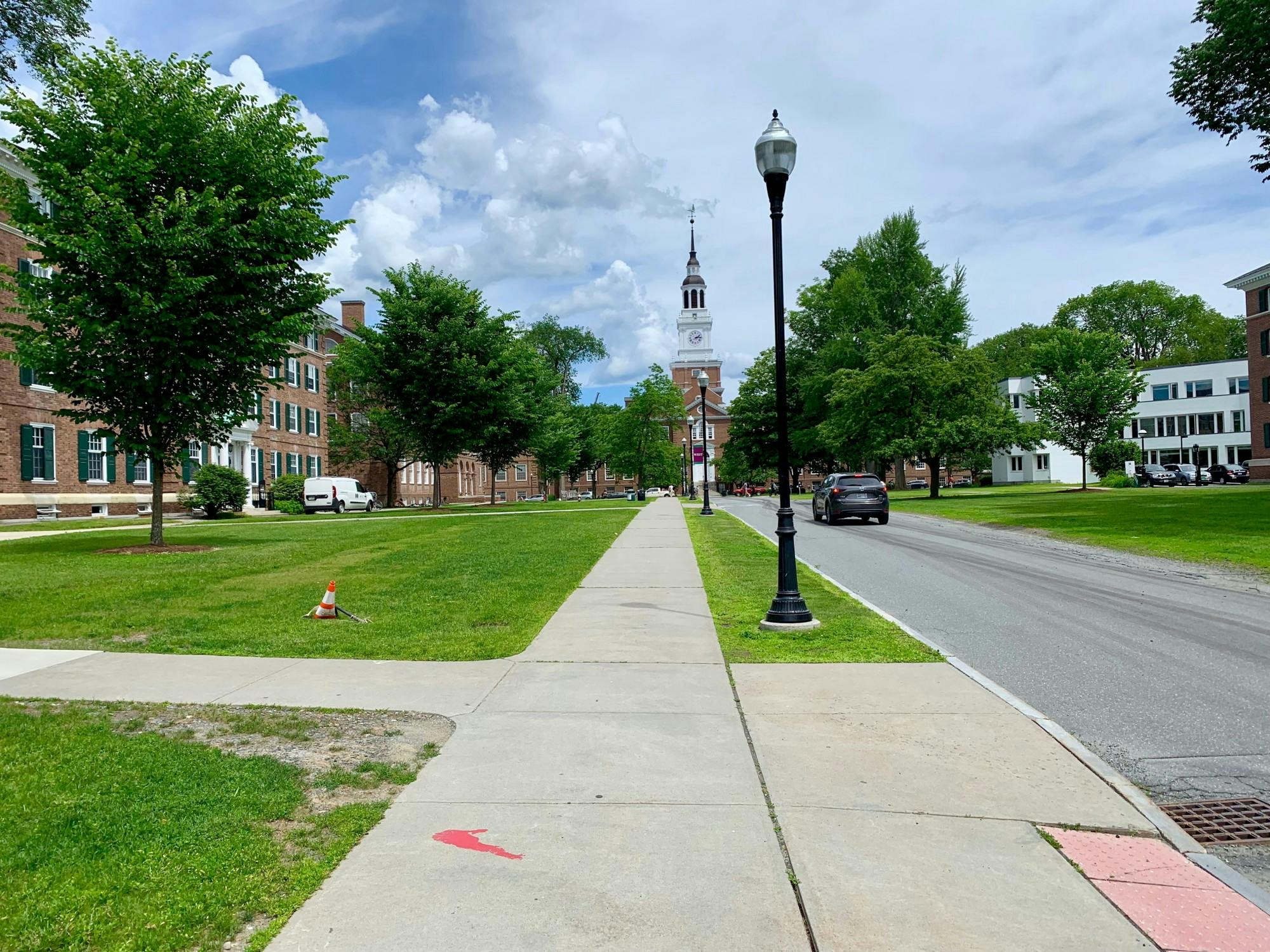This term, I’m finally taking the legendary course that is ENGS 12, “Design Thinking.”
Okay, maybe legendary is a strong word — but I’ve never heard so many people describe a course as “life-changing” before, and when I was reflecting on how I wanted to spend my last term as an undergrad, I figured it was my last chance to find out what all the buzz was about. That said, nearly every time I tell people that I’m taking ENGS 12, they follow up by asking if I’m taking it for the distrib. It seems to them almost unfathomable that a senior in his last term would take a class not for any requirement, but simply to learn and acquire new life skills.
Almost a month in, I can confidently say that I’m glad I chose to take “Design Thinking.” It offers a new kind of mental stimulation that I haven’t gotten out of other classes, and while I didn’t think I’d have quite as many late nights this term making prototypes out of paper and cardboard or learning how to use Photoshop, I can’t complain too much.
Lately, something we’ve been talking a lot about in class is this idea of “reframing” how we think. We all carry with us so many assumptions and beliefs, many of which are problematic, and changing those requires a lot of intentional effort. Among the many lessons this pandemic has shown us is that throwing more facts and logic at someone isn’t enough to change how they think — you have to be creative and empathetic to even stand a chance.
So why don’t we try to reframe some of our beliefs about Dartmouth? I think I know a good place to start: our tendency to romanticize spring term.
If reframing our feelings toward spring term were as easy as saying “no term is perfect,” I could end this column right here. If you were feeling nostalgic about the weather, I could remind you that here in Hanover, it snowed last week and is dismally rainy right now. If you missed the carefree atmosphere we all remember so well, I could remind you that most of us like to forget the nights spent grinding away in the library — bonus points if you had to work through an “on” night.
But it’s not that easy. I’m guilty of romanticizing the spring too, even though each spring I’ve spent at Dartmouth has been far from perfect.
I think back to freshman spring: memories of taking my first Italian class, starting training as a tour guide, getting accepted to Lodj Croo. These were all major events that would irreversibly change my Dartmouth trajectory, so it makes sense that I would look back on them fondly. There were lots of smaller memories too, from soaking up the sun on the Green to learning how to order food from Collis, and even spending hours with friends on FFB pretending to study. Sure, it wasn’t all perfect — giving into peer pressure and buying my first pair of Sperry’s and shorts from Vineyard Vines might have been a personal low — but overall it was a great spring. Right?
Well, as you probably have guessed by now, the answer is no, not quite. When I look back on freshman spring, I conveniently tend to overlook things like being haunted by CHEM 6, “General Chemistry” problem sets, feeling perpetually sleep-deprived because of 7:45 a.m. drill and struggling to meet brothers in fraternities and get invited to pre-rush events. I hated the Green Key concert, only to feel guilty for not liking what everyone else seemed to love, and I had plenty of academic failures too. I laugh at it now, but at the time, the B- with which I finished CHEM 6 felt like the biggest slap in the face ever.
Okay, so maybe freshman spring wasn’t perfect, but weren’t these all just common problems any freshman goes through? Isn’t it a rite of passage we all learn and grow from? Well, maybe some of that is true — and believe me, I’m not saying I had a horrible freshman spring by any means — but let’s keep going.
Sophomore spring was supposed to be better than freshman spring in every way. I was coming back from a term abroad, so I was extra excited to be back on campus. Rush was behind me, and I was eager to finally have a community on campus I could say with the utmost certainty I belonged to. I was taking my most liberal-artsy course load ever — a creative writing class, a game design class and my first (and only) venture into the economics department — and to top it all off, I was in my first ever relationship. A year prior I might have struggled, but now I was on top of the world.
Except that wasn’t true at all. Sophomore spring, and the summer that would follow, were easily the two terms on campus during which I cried the most. I spent weeks trying to muster up the courage to come out to my dad, with plenty of failed attempts, and when it finally happened, it wasn’t the best-case scenario I had hoped for. My mental health was rapidly spiraling downward, and that manifested in ways from being too scared to go to class to beating myself up for not knowing which major to pick. My fraternity was closed that term, and I felt extra out of place, like a wolf without a pack, when I tried to visit my friends in other houses.
Before I continue, it’s worth asking: What’s the big deal about reframing these memories, anyway? Isn’t a certain amount of nostalgia normal, healthy even? For me, a big piece is not wanting to perpetuate the stigma around struggling and asking for help. We all know about the “Stanford duck syndrome” — we get it, no one is just “coasting through” Dartmouth, everyone has their own set of problems and stressors — but so many of us perpetuate the myth that we’re all okay anyway. If someone asks me how I’m doing, and I lie and say “fine” when that couldn’t be further from the truth, I might be part of the problem.
We all know this in theory: “Be honest. It’s okay to admit when you’re not okay. You should never feel ashamed of asking for help.” But again, easier said than done. And our natural instinct to focus on the good and forget the bad doesn’t help.
Back to spring term: third time’s the charm, right? By junior spring, I was finally recovering from an especially tough break up two terms earlier, and nearly all of my favorite people were back on campus. I had finally declared my major (only a year late!), I was enjoying my jobs and extracurricular activities and with some newfound confidence, I even took a few fashion risks — my friends will remember the infamous “not a romper” from Green Key 2019. I prioritized taking photos with my friends, enjoying the weather once it finally got warmer and spending time with my favorite ’19s before they left. I even stayed on campus after spring term to work commencement and reunions, and for the first time, I left campus for the summer with a real sense of closure.
If you were expecting another paragraph about why junior spring was a terrible term, I’m happy to say that’s not the case. In fact, if I had to rank them, it might be the best term I’ve ever had at Dartmouth. It definitely wasn’t perfect — I spent most of the term stressing over not yet having a summer internship and starting major assignments hours before they were due — but it didn’t need to be perfect to be great.
I think that leads me to the real question on my mind: How will I romanticize senior spring? Right now, between the intense workload, the lack of socialization and the mostly dreary weather, it’s easy to say that this term isn’t my favorite. When I think of this term now, I think of late nights, social distancing and a whole lot of loneliness.
But when this term ends, will I remember a completely different side of spring term? Will I instead remember the warm spring air and freedom from the real world? Will I be thankful to have had one last term on campus, to enjoy the granite of New Hampshire for a few months longer? This term has been hard on everyone, but I can’t help but feel like in some perverse way, when it’s long over, we’ll miss parts of it.
Or, at the very least, we’ll be tempted to miss parts of this term and forget others. To romanticize is to take the easy route. To reframe that romanticization takes some work.
If you asked me if I would choose to magically relive one of my previous spring terms, my instinct would be to say yes without hesitation. Those were happier, simpler times, and certainly better than what we’re living through right now. But if I were to actually go back, I’d quickly find that not a single spring was as wonderful as I remember.
So, if given the choice, I might hesitate, but I’d ultimately go against my instincts and decline the offer. I’d rather keep moving forward.




